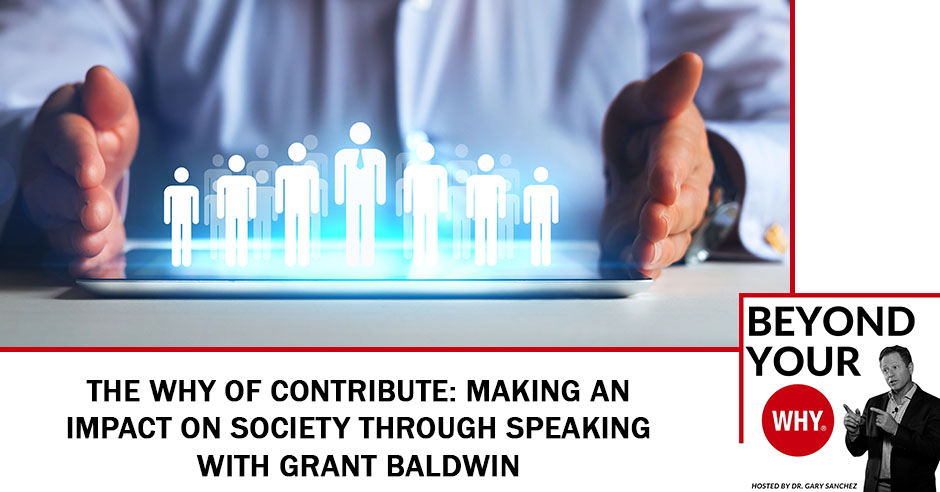
Want to be part of a greater cause, but don’t know how? Learn from this episode’s guest, who is the epitome of the WHY of Contribute. Grant Baldwin, the founder of The Speaker Lab, has helped thousands of people build successful and sustainable speaking businesses. A renowned speaker himself, Grant shares his stories and experiences with his audience to contribute to their growth. In this episode, he discusses strategies and techniques for being a great speaker. He also shares stories of challenges throughout his speaking career and how it has impacted his life and the people around him, especially his family! Tune in so you can gain valuable insights and unleash the creativity you have within you.
—
Watch the episode here
Listen to the podcast here
The WHY Of Contribute: Making An Impact On Society Through Speaking With Grant Baldwin
In this episode, we are going to be talking about the why of contributing. If this is your why then you want to be part of a greater cause. Something bigger than yourself. You don’t necessarily want to be the face of the cause but you want to contribute to it in a meaningful way. You love to support others and relish success that contributes to the team’s greater good.
You see group victories as personal victories. You are often behind the scenes looking for ways to make the world better. You make a reliable and committed teammate and often act as the glue that holds everyone else together. You use your time, money, energy, and resources to add value to other people and organizations.
I’ve got a great guest for you. His name is Grant Baldwin. He is the Founder and CEO of The Speaker Lab. He has helped thousands of people build successful and sustainable speaking businesses. Over the last several years, he has become a sought-after speaker, podcaster, author, and accomplished entrepreneur. He’s featured in Inc 500 list, Forbes, Entrepreneur, and The Huffington Post. He has committed his expertise and insight to equip others to share their meaningful message with the masses.
With a mission to motivate other leaders and entrepreneurs, he has developed a training course with The Speaker Lab completed by over 2,000 speakers and counting and created a multitude of additional resources for speakers with varying levels of experience. His leadership and dedication to creating a one-of-a-kind organizational culture are evidenced by the impact of the team he leads. His favorite moments are those spent with his high school sweetheart, Sheila, and their three daughters. They live in Nashville, Tennessee, where he enjoys playing pickleball, summer days at the pool, and living the life of Chuck Norris.
—
Grant, welcome to the show.
Gary, thanks for letting me hang out with you. I appreciate it.
This is going to be fun. The timing of this is perfect because there are so many people that I know in particular, and many of our readers are coaches, speakers, entrepreneurs, and going to be speakers. This is great to have you on the show. Let’s go back to your life. Tell us where did you grow up, where were you born, and what were you like in high school.
I was born and raised in Springfield in Southwest Missouri. I grew up in a normal middle-class home. My dad worked for a radio for most of his career. When I was in middle school or so, he switched careers and was working in the power co-op space doing marketing and consulting for them. A bit of a freelancer that we would think about it.
That was my first foray into him working from home, having some freedom and flexibility. I was like, “That seems like a nice gig.” I wouldn’t mind doing that, and with that entrepreneurial bug. My mom has been in healthcare her entire profession. In high school, my parents split up, which had a big impact on my world. With that, I’ve got involved in my local church.
My youth pastor had a big impact on my life. That was the path I was on. I was like, “I want to do that. That seems like a rewarding and fulfilling career. If I can make the impact on others that he made in my own life, that seems interesting.” That’s the direction I was headed. I went to Bible college as a youth pastor for a little while and got a little taste of speaking but other than my parents splitting up at the time and even looking back, I felt like a normal middle-class childhood.
In high school, I was involved in my local church and had various leadership roles there. Speaking is one of those things that I had an opportunity to get on stage a few times. The bug bit me there. It was like, “I could do this. I would love to do more of this.” Even in college, I worked for a guy who was a full-time speaker. I’ve got to see a little bit behind the scenes of what that was like. There were some highs and lows to childhood and high school life but everything led to this moment. I’m happy with how things have turned out.
You went to high school in Springfield. Where did you go to college?
I went to college in Springfield. It’s a small little private college, Central Bible College and it merged with another school, so it’s not even there. That’s where it was at.
What was your first career path or job?
[bctt tweet=”Strive to make a big impact in someone’s life.” username=”whyinstitute”]
My first career thing was I was a youth pastor at another church. I did that for about a year and a half, which gave me a lot of opportunities to speak. I was speaking every week to students, and then from time to time, I would get to speak on the weekend at the big church. I’ve got a couple of at-bats there. It was one of those things that I enjoyed. I felt like I was decent at it. I wanted to do more of it. When my wife was pregnant with our oldest daughter, there’s nothing like bringing a kid into the world that causes you to question everything.
As a youth pastor, there were parts of it I like and didn’t like but one of the things I enjoyed was speaking. I was like, “I want to give this speaking thing a shot but I wasn’t sure. What does that even mean? What does that look like? How do you find gigs? What do you speak about? Who hires speakers? How much do you charge? How does this mysterious black box of speaking work?”
I started emailing, stalking, and harassing speakers because, at the time, there wasn’t any coaching or training, books, resources or podcasts on this. It was a DIY figured out on your own. My best effort to figure it out was emailing a bunch of speakers, pestering them, trying to get a couple of answers, piecing some stuff together, and trying to take action on it.
Being a pastor that’s even more of a legit gig than a speaker because you’ve got to do it every week. You’ve got to be different and be on. There’s a lot of pressure, I would have guessed.
One of the pros and cons of being in ministry and speaking is that you have largely the same audience every week. Most of the time, as a professional speaker, you are telling a lot of the same stories and doing a lot of the same material. Each time you tell a story, you are getting real-time feedback from that audience. When you tell it the next time, it becomes better over time.
Whereas, in ministry, when you are speaking, you have the same audience. If you tell a story that kills this week, you can’t tell the same story next week. It forces you to come up with new content. Sunday is always coming, and you’ve got to come up with new material. There were upsides to that that helped you to figure out real quick if you could keep up with this at a sustainable pace.
I have always wondered what is it like. I speak as well, and it’s the same presentation with some tweaks here and there wherever you go but to do a different one every week, there’s a lot of skill involved there.
It takes a lot of preparation. You’ve got to have a good system. If you are doing 30, 40 to 50 new talks a year, that’s a lot of stuff. Thankfully for me, if I was speaking with the students, it’s a little bit more casual. You are having more discussions and small group-type stuff. It’s not like you are having a 60-minute keynote every single week or something like that.
Even the times that I would speak on the weekends in the main services, it wasn’t like I was speaking every single week. I might speak 5 or 6 times a year. Even though I was having to be 5 or 6 new talks, it wasn’t like a week after week where you are trying to come up with something new but I always knew what my schedule was. For example, Sunday is coming in two months, and I’ve got to have something to say, “Here’s what the series or topic is.”
It also helps you to put up your radar so that I know I was speaking about being a good parent. I’m in-between points A and B. I’m looking for things that are on my radar related to parenting and illustrations, stories or things that have happened in my life or anything related to that that I could utilize or tie in. Maybe something I saw in a magazine or an article that I read, a YouTube video or whatever but having your radar up of, “Some of type new presentation has got to come together.” You don’t want to sit down the night before like, “What are we going to talk about?”

It’s collecting those thoughts, starting to organize them into something, and having that ready a few days out. One thing I did and still would do is to spend a lot of time practicing and preparing. There’s a misconception that the best speakers in the world scribble a couple of ideas on a napkin and then hop up there, wing it and shoot from the hip. It doesn’t work like that.
They spend a lot of time practicing, preparing, and rehearsing behind the scenes. When they hop up on stage, it looks supernatural. It looks like they are shooting from the hip and talking off the cuff but that’s not the case at all. They do spend a lot of time. I try to spend a lot of time making sure that when I’ve got up there that even though it was the first time I was presenting this that I felt confident and prepared.
What would you say is the best thing that you learned from giving a different talk every week? Most of us, if not all of us, will never do that. You did that for however many years. What’s the most valuable lesson you learned from a different talk every week?
It forces you to get good at content, finding content, identifying content, and learning what works. You and I have the same 3, 4 or 5 stories that we tell over and over again. It’s easy to become complacent, lazy and be like, “I know this material works, so I keep going back to this,” versus, “If I couldn’t tell any of those five stories again, then I’ve got to find something different.”
There’s a speaker and a friend of mine who calls it the new two. Meaning every time he speaks, even though a lot of the content is the content he’s done before, he forces himself to find a new 2, 2 minutes that he has never presented before. Sometimes maybe you present those two minutes, it goes somewhere and works, then you turn it into 5 or 7 minutes, and it worked. It makes it to the cutting room floor but it forces you to be into the rhythm and routine of, “I’ve got to try new stuff,” versus resting on what’s worked and thinking that will always be the case.
When I think back to my first speaking events versus where I am, there’s this nervousness about interacting. It was all about me. When you get up there for the first time, you are like, “I hope I don’t look stupid and sound bad,” and all the things that you go through, whereas after you have done so many, you become good at interacting with the audience or crowd and being able to engage differently with that level of comfort.
One interesting thing, especially in the church world or the ministry world is when you have the same audience, they are at least familiar with you. If you do 50 events in a year and it’s 50 different clients, then every time you speak, you are trying to build rapport and connection with the audience. They have no idea who you are.
Whereas when you are speaking to the same audience on some type of consistent basis, you will at least have some type of familiarity there, so you don’t have to go into too much background of who you are and why you are here, this song and dance but for the most of the audience, you get some type of connection there because they are already familiar with you.
It’s the difference between going to a comedy club to see any comedian, whoever’s up there that’s selling jokes, versus you bought a ticket to see a specific comedian or a band versus going to a music venue because you are like, “I want to hear some live music.” There’s at least some familiarity there that makes a big difference in terms of the rapport that has already been established.
You graduated from college and then started as a pastor at a church. You then went outside the church and started doing more secular-type talks. What prompted that direction? What were you speaking about?
[bctt tweet=”Spend a lot of time practicing and preparing if you want to be a great speaker.” username=”whyinstitute”]
I did a lot in the education space, in high schools and colleges. Working with students was a world that I was familiar with and understood. It landed itself well to speaking in that world. There are a couple of guys that I knew that were doing some speaking in that world. I was pretty young myself. I was 24, 25 at the time. The idea of speaking to corporate CEOs or something that are like, “You could be my son.”
Early on, I worked with a similar company. They would book me to go out, speak and present their content. I would speak on time management or organization. A lot of times they would send me to environments where I was the youngest person in the room. There’s a lot of Imposter syndrome, especially early on. I’m like, “Who am I to be here? I don’t have anything to bring to the table.”
I did a lot of school assemblies and student leadership conferences. Those were environments that forced you to be a good speaker. You have a lot of adult audiences that are polite and friendly. If you are not doing a good job, they will still smile, nod, and play along but if you are talking to a group of 15, 16, and 17-year-olds that don’t want to be there, you better be good as a speaker to keep them engaged. That also helped me to become better as a speaker over time because those are unique audiences and environments.
From education, where did you end up? How did you get into coaching other speakers?
I was a full-time speaker for several years. In the 1st year, I was doing 20 to 30 events and then 40 to 50 events. Eventually, it got to a point where I was doing about 70 gigs a year. I enjoyed it. There’s a lot of fun. The nature of speaking is that it’s a high-paying manual labor job. I would get paid well to stand on stage and talk but the nature of it was I had to leave my family, get on a plane and go somewhere. It’s like a surgeon. A surgeon makes good money but like surgeries, you’ve got to show up and do surgery. I felt like I had a good job but I didn’t necessarily have a business. There’s this limited flexibility.
I was like, “Now what? What do I do from here on?” The only way to broaden your impact, reach or income is you either have to do more gigs or charge more. I was already at the upper limit of what I felt comfortable charging in that particular industry and the education space. I didn’t necessarily want to be on the road anymore.
It was 2013 and 2014 when I started noticing more podcasts, online training, and the online business world. At the time, I had a lot of people who are asking me, “I want to be a speaker. How would I go about doing that?” A lot of times, what would happen is people would use the phrase, and we have both said this phrase to other people as well, which is, “How did you get into that?”
What I decided to do is, at the time, I was doing a lot of speaking around the topic of careers, helping people think through and figure out what they wanted to do with life, especially high school and college students, so I started a podcast called How Did You Get Into That? We were interviewing interesting, unique people who had crazy careers like a guy who was a LEGO master builder, one of the top LEGO builders in the world, a guy who worked for Nike and Michael Jordan designing the Air Jordans, a guy who was an NBA mascot and a lady who was one of the top cheese experts in the world.
These types of careers where you are talking to people going like, “I don’t personally want to do that but it’s fascinating that you make a career from that. How did you get into that? What does that look like?” I did that for a little while. I had a lot of people asking me, “How did you get into that? I want to be a speaker. How would I do that?”
At that point, I started doing a little bit of coaching and teaching around that. I enjoyed it. I felt like we were creating a solution to the problem that I had when I’ve got started. There wasn’t anyone readily available. There was no podcast, coaching, training, books or resources about how do I become a speaker. We tried to create some resources that I wish I had when I’ve got started. One thing we quickly figured out is that there are a lot of people who are interested in speaking and who could do this that need some help in the next step.

When I’ve got started, I felt like I had the potential but I needed the plan. I feel like I was a decent speaker. I wasn’t the best or worst. I always knew that there was something there but I needed a plan and someone to tell me. “I can do the work. Just show me what to do. Tell me what steps I need to take. What are the action items I need to execute here?” I felt like there were a lot of people in that same spot. That’s when we started leaning into the speaker training and coaching that has evolved into what we do.
Who would be an ideal client for you? Who are you looking to connect with you? Why would they be looking for you?
There are a lot of people who are interested in speaking and people listening who have done some speaking. Maybe it’s something that fell in your lap. It was a word-of-mouth thing, a referral or something for your company. It was something that was a friend recommended you to. A lot of times it’s like this, “We enjoy speaking and want to do more of it but we don’t know what to do next. Do I sit back and wait for other people to magically find me? Do I click my heels together, close my eyes tight, and then hopefully another gig falls in my lap?”
We both understand, and everybody reading understands that that’s not a way to build a business. Rather than being reactive, we want to teach people to be proactive and understand the steps that you need to take to build and grow a speaking business. There are going to be people who are reading that’s like, “I would love to do 60, 70, 100 gigs a year and be a full-time speaker.” Other people are like, “That has zero appeal to me. I would love to do 5 or 10 gigs a year, maybe in addition to what I’m already doing in my business or within my company. Maybe in addition to my coaching or consulting. Maybe using it as lead generation for some other stuff that I’m doing.
We want to do some level of speaking but we don’t know how to get started. We don’t know what we don’t know. “How do I find gigs? What do I charge? Who hires speakers? What do I speak about? How does this mysterious black box of speaking work?” That’s who we work with. We try to demystify that and give a roadmap and framework for how you consistently be able to find and book paid gigs and also share your message with others.
This is probably crossing the minds of people reading, and it was crossing my mind. You did 70 gigs one year. Is it positive or negative? You made a lot of money and did a lot of traveling but what’s that like?
It’s a blast and fun. I will give you the highs and the lows of it. The upside is travel can be fun. I have been to 49 US states and multiple countries and seen a lot of parts of the country that most people will never see in a lifetime. That’s cool and enjoyable. The downside of the travel part is you are away from the family, sleeping in another hotel, eating hotel food or food on the road when you want a home-cooked meal. There’s certainly a lot of that.
The upside is it’s not bad. Speaking and having hundreds or thousands of people listening to you, people wanting to shake your hand, take pictures with you, ask for your autograph or give you a standing ovation. Most people don’t get applause when they do their job. To finish sharing some ideas and everybody claps for you is pretty fun. There are a lot of upsides to it.
Being a speaker, the actual speaking part is a very small part of it. You spend a lot of time waiting. You are waiting backstage, on planes, at the airport, in hotels, in rental cars, and then you do your thing, your little dog and pony show. You then go back to waiting and heading home. Doing 60, 70 gigs a year led to being on the road 80, 90 nights a year. It’s also can be a little bit cyclical over a year. You would have seasons where you were busy. You may have 4 gigs in 7 days, and you are on the road going from city to city.
December would be slow. Nobody is booking things around the holidays. You may be gone for a long, long stretch of week to week but then you may be home for a full month and not going anywhere. My wife is going like, “You’ve got a gig or something you could go do?” It comes and goes in waves but it’s enjoyable knowing that you are doing something that’s making an impact, able to travel, connect with some great people and make a difference with the work that you are doing. There are downsides but it’s also incredibly rewarding and fulfilling.
[bctt tweet=”Who you are is more important than what you do.” username=”whyinstitute”]
I was talking to a friend of mine that does a lot of speaking more than I do. In 1 year, he did 134 events. He said it was mind-numbing and was too much. He did 4 in 1 day. I don’t know how you can function that way but the high is really high.
One of the great things is that the pandemic has been good for the speaking industry. What I mean by that is that prior to COVID, virtual speaking wasn’t even a thing. Event planners and speakers weren’t taking it seriously. When COVID hit, all events come to a screeching halt, and there were no other options. Virtual speaking becomes the only game in town.
For several months there was the Wild Wild West, and everyone was figuring out what this new normal looked like from a speaking presenting standpoint but a couple of years later, hopefully, we come out of the pandemic more and more each day, we are seeing that live events have come back with a vengeance because apart, they haven’t happened for a while, so people crave being together in person. There’s nothing that compares to being together with other human beings in a room.
Even in the handful of events that I have been to in a few months that people are like, “We are back. We are together. This is awesome,” hugs, high fives, and handshakes, people crave that type of community and atmosphere that a live event can provide. What’s happened is that although live events have come back, they have not come back in replacement for virtual events. They have come back in addition.
There are a lot of virtual events that continue to exist. We have seen more events than ever because both live and virtual events exist. We are also seeing a lot of hybrid events that are taking place where a speaker may come in and speak in person but there’s a virtual audience or where speakers are speaking in person once. Maybe they are doing three months of follow-up Zoom calls, where they are going deeper on the content or helping to apply the content that was presented.
It sounds weird but the pandemic is one of the best possible things to happen to the speaking industry and has created enormous new opportunities that didn’t previously exist. All that to say, there are a lot of opportunities for people to say, “I want to be a speaker but I don’t want to be on the road that much.” That didn’t exist in 2020. There are a lot of speakers who are killing and doing it while staying home. There are pros and cons and trade-offs to virtual speaking versus in-person speaking but the point is, there are a lot more opportunities and options that exist with virtual speaking that didn’t previously exist.
What have you noticed to be the difference between virtual speaking and live speaking?
It doesn’t compare to being together in person. One of the best parts of speaking is being able to feed off the energy of the audience and see people nodding, taking notes, laughing, smiling, elbow in their neighbor or anything like that. You lose all of that with virtual. As you and I are talking, we are each sitting in our rooms and talking to ourselves via a screen. It’s a different atmosphere and environment.
It’s not that it’s bad. It still works and is effective. By giving a virtual presentation, you are able to give multiple presentations on the same day to multiple states, audiences or countries. You can have attendees from all over the world. It opens up opportunities that physically and geographically are not possible whenever it comes to physical in-person speaking. There are pros and cons to it but there’s nothing that compares to being together live in person with an audience.
Have you noticed that the presentation has to be different for a virtual audience versus a live audience?

Yes. Just because someone is a good in-person speaker, doesn’t necessarily mean they are a good virtual speaker. What a lot of speakers found out early on in the pandemic is that some stuff that may work in person doesn’t translate online and vice versa. We have to figure out how do you engage an audience and keep an audience with you because the other thing that’s difficult in a virtual environment is all the audience is watching on a screen, where you are also going to be competing with other tabs, their email, text message, TV, Slack and other notifications that may be popping up.
Whereas when you are in person, you may still have some of those things but it’s a little bit harder for them to be massively distracted when you are sitting there right in front of them in person talking. When you are just a talking head on a screen, they can turn off their camera, muted it, and not necessarily have to talk. It’s a little bit easier for them to get distracted. You’ve got to be aware of that and make sure that you are looking for other opportunities and ways to keep them engaged.
Have you got any tips or secrets for us that can help us keep people engaged in a virtual presentation?
Some of it depends on the nature of the presentation, how long it is and how big are the audiences but one thing that you can do is utilize the chat. Simple things like every few minutes, these pattern interrupts, “If you are with me, type in with you. Tell me in the chat where you are from. If this has ever happened to you, type I in the chat.”
Anything like that where normally you might be like, “How many of you have ever experienced this? Raise your hand.” People would physically raise their hands. “Turn to your neighbor and say this. Nod your head if you have had this experience.” Some of those interactive experiences that we would do in person, we can still do virtually.
Chat is a good way to do that to force people to re-engage and lock in. Also, utilizing slides can be helpful and effective, so it’s not just a talking head but it’s giving us something to look at. If you are going through slides quickly, it keeps them engaged in the same way that you are watching a TV show or sitcom. They are changing scenes and camera angles every few seconds because they know that people’s attention span is going to start to wane, lose interest, and be distracted. You’ve got to keep people on their toes and keep mixing it up.
Also, the length of a presentation. If you are talking with a potential client and they said, “We want to do three hours on Zoom,” that sounds like a disaster. Zoom fatigue is a real thing. None of us want to do that. Keep it short, concise, and half the length of what an in-person would be. If you were going to do 3 hours, try to keep it to 1 and a half or 1 hour and tighten up everything. Even 1 and a half or 1 hour is a long time staring at a Zoom screen. It’s things that you want to be aware of. You can also do a Q&A, mix it up with that or do some type of breakout groups. There are a lot of good breakout room options within Zoom that you can do to mix up the formatting of a presentation.
When you would speak on stage, did you typically speak with a presentation deck or without one?
As far as slides, I typically have not used slides. There are pros and cons to slides. Slides can be beneficial for keeping an audience engaged but can also be a big distraction for speakers. What we always tell speakers is, “If you are going to use slides, you want to use them as an enhancement, not a replacement to your presentation.”
Here’s what I think about this. I remember a few years ago, my wife was attending a conference, and she texted me. She was in a session and said that the presenter was there. They said that they couldn’t give their talk because their slides wouldn’t work. A good litmus test would be, let’s say, you have slides, and five minutes before you are going to go up, the projector fails, the computer crashes or something happens, and you can’t give your presentation with the slides. The presentation should still be able to stand on its own. It should still be solid.
[bctt tweet=”If we’re great speakers, authors, entrepreneurs, business owners or coaches or consultants, but we dropped the bomb as husbands, dads, moms, wives as if we are the shell of a human being, then we’ve really missed the point. ” username=”whyinstitute”]
What happens oftentimes is that slides become a crutch and cue cards for a speaker. That takes away from the presentation. If you are going to use it, pop-up slides with tacks on them and read off everything that’s on there, then just play a video. You don’t have to be there. There’s nothing wrong with slides. Slides can be powerful and effective but they should be an enhancement and not a replacement for your talk.
It takes a better speaker to speak without slides because the focus is 100% on you. There is no getting around that one. You can’t show something funny or throw something up that’s interesting. It’s got to be all about you. It feels that way. What’s your take on that?
You’ve got to be a solid speaker. You can use a crutch in a couple of different ways like, “I’m going to put up some stuff, and the image is going to capture people’s attention. It means that I can be less engaging for a few moments there while people are looking at the image, watching a video or something like that.” When you have nothing up on the screen that people can look at, you’ve got to be good on stage. The other thing is when speakers use their slides as cue cards and go like, “I’m trying to remember what comes next, so next slide,” it can become a cop-out, and you become lazy.
I remember at a conference a couple of years ago that I was speaking at, I was backstage and talking with a speaker who was getting ready to go on. He was obsessed with his slides. I was like, “What about the talk? That’s what people are here for.” There’s nothing wrong with slides, I’m not saying it is but they should be an enhancement, not a replacement of the presentation.
How many talks do you think you’ve given in your life so far?
Live in-person over 1,000 presentations and talks, threw in virtual in there. We are in a day and age where everyone’s definition of what a presentation is looks different. Is this a presentation, webinars, podcasts, interviews, Facebook lives or anything like that versus what we typically standardly think of as a presentation like, “I was hired to do a keynote or a workshop and break out in front of this audience?” A lot of times, for sure.
The reason I’m asking you that is because I’m curious what percentage of the time when you show up to do a speaking event, let’s say live. Is there a tech glitch or something doesn’t work? How often does that happen?
Not often but it happens. I will give you a couple of thoughts. One is those moments help you to become a better speaker because something happened outside the norm, and so you’ve got to be able to roll with it. I would rarely use slides. That was one less variable that I could control that wasn’t going to be an issue but there were times, especially when I was doing a lot of speaking in high schools when it hasn’t had a great sound setup, sound system or anything like that. It wasn’t uncommon for a mic to fail or be staticky.
I remember one time I was in a gymnasium with over 1,000 students, and the mic goes down. I was looking for some help with some backup batteries or a new mic, and no one was doing anything. I was like, “Screw it.” I put the mic down, yell, project and make it work. The show must go on. When those moments happen that are outside the norm, a speaker can utilize and lean into that. Everyone loves an inside joke, and you had to be there. When something happens that is not scripted and not supposed to happen, it creates this moment that we can all laugh about.
A few years ago, I was speaking at a conference center, and a dog comes running in, zipping around the room. That’s not planned, and it was not my dog. I don’t know whose dog that was or how it got into the building but it creates this raw, real moment of like, “You had to be there. We can all laugh and joke about it,” then you move on. As a speaker, when those moments happen, it’s a good chance to build this rapport with the audience but make some humor and also realize, “This happened outside of my control. How do I address it?” Deal with it, do whatever, move on and continue the presentation.
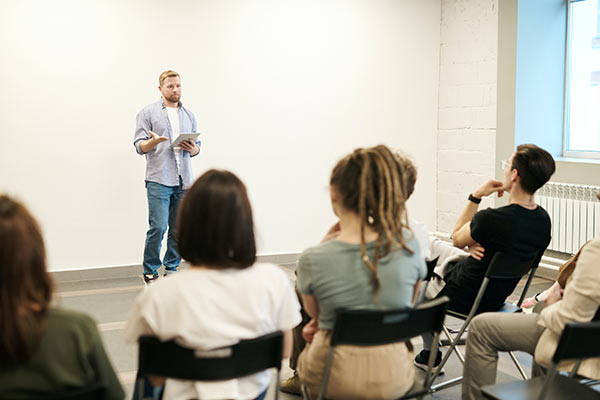
It seemed like for a while, every single event that I spoke at had different setups and attachments. Everything was different. There was no standardization of anything. Half the time, it would work, and half the time, it wouldn’t work with a Mac. Sometimes I’m putting it on a thumb drive and stick it into their computers. The screens would go out or something would happen but it ended up being something good because I almost expect it to happen and when it does, so what? It’s not a big deal.
That speaks to how important it is to do some type of test run with the AV team. Even if I wasn’t using any slides, one of the things I would always make sure is I can get some type of tech run-through so I could get a sense of like, “What’s the lighting going to be like? Where’s the audience going to be? If there are going to be cameras, where are those cameras going to be? Which microphone? Am I going to be using the handheld? Is it going to have a wire or cord to it? Am I going to use a lapel that sits on my shirt? Am I going to use more of a Countryman that fits over my ear?”
There are all these different nuances and variables. You want to be prepared for all those things. If I’m using sides, I want to plug it into my computer, hook it up and see those slides on the screen. I want to see if the orientation is correct or if something looks skewed in any way that I want to make sure we get that fixed. You are not trying to scramble and adjust those things on the fly but like, “No, I have shown up and prepared. Make sure all the variables are correct and where they need to be.”
It’s part of being a professional. Part of doing a good job is not just what you do on stage but also how you work offstage. “Were you on time? Were you nice to the tech crew? Did you make sure that you had your ducks in a row and your slides look good?” All of those little nuance things add and contribute to you as an overall presenter, whether or not people want to work with you.
Are you saying that being a professional speaker is more than taking a couple of shots of tequila, running up on stage, and talking?
Yes, 1,000%. Part of being a great speaker is what happens on stage but a big part of it is what happens offstage. You think about it from an event planners’ perspective. The speaker at an event is an important part of the event but it’s 1 of 100, if not 1,000, moving pieces that they are trying to handle, think through, and be prepared for. The easier you can be to work with, the simpler that you can make things on them, the better you can make their life, the less of a pain in the butt you are, the more likely they are going to want to work with you, refer you, recommend you and bring you back.
This isn’t exclusive to speakers. This is any type of vendor. If you were hiring someone to mow your grass and made the grass look amazing but they don’t show up on time, charge you weird, don’t do what they said they are going to do, reschedule for you, they are a pain in the butt, not like a diva or a prima donna. They are dropping the ball on simple things. Do what you say you are going to do. If you can’t do what you said you are going to do, communicate with the event planner. If you do those things and you are average on stage, you can be successful as a speaker.
Last question, what’s the best piece of advice that you’ve ever gotten or given?
The thing that I tell our team regularly is something I used to speak about was, “Who you are is more important than what you do.” If we are great speakers, authors, entrepreneurs or business owners, coaches, and consultants but we dropped the bomb as husbands, dads, moms, and wives, as if we are the shell of human beings, then we have missed the point. I love talking about speaking. I love being an entrepreneur and business owner. I love making a little dent in the world but my most important roles on this planet are being a good husband and dad.
I’ve got married to my high school sweetheart. We’ve got three beautiful daughters. It’s me in a house full of women. It’s the absolute best. Those four ladies are the most important responsibility in my world. I love all this other business nonsense we get to play around with and this sandbox we get to play in but those things are the important thing. I try to remind people and keep it top of mind that who you are is more important than what you do.
If there are people that are reading this who want to connect with you, learn to be better speakers, and get into the speaking game, what’s the best way for them to connect with you?
I would encourage you to check The Speaker Lab Podcast. We’ve got nearly 400 episodes. They are all different subjects or topics related to anything and everything about speaking. That’s a great resource. Everything else we do is over at TheSpeakerLab.com. We’ve got a lot of free resources and articles over there. We have a Speaking Fee Calculator there.
When people ask, “How much should I charge as a speaker?” The answer is it depends. There are a lot of variables that go into it. We have put together a calculator. It’s free. Answer a couple of questions, and it will spit out several what you should be charging. You can also find that directly over MySpeakerFee.com. We try to do anything that we can to support speakers as they build and grow their businesses.
Grant, thank you so much for being here. I appreciate your time. I look forward to staying in touch as we go along our paths.
Gary, thanks for the time. I appreciate it.
—
Thank you so much for reading this episode with Grant Baldwin. If you have not yet discovered your why, then go to WhyInstitute.com. You can use the code PODCAST50 to discover your why at half price. If you love our show, please don’t forget to subscribe, leave us a review, and rating on whatever platform you are using. Thank you so much for being here. I will see you next time.
Important Links
About Grant Baldwin
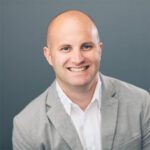 As founder and CEO of The Speaker Lab, Grant Baldwin has helped thousands of people build successful and sustainable speaking businesses. Over the last 15 years Grant has become a sought after speaker, podcaster, author, and accomplished entrepreneur.
As founder and CEO of The Speaker Lab, Grant Baldwin has helped thousands of people build successful and sustainable speaking businesses. Over the last 15 years Grant has become a sought after speaker, podcaster, author, and accomplished entrepreneur.
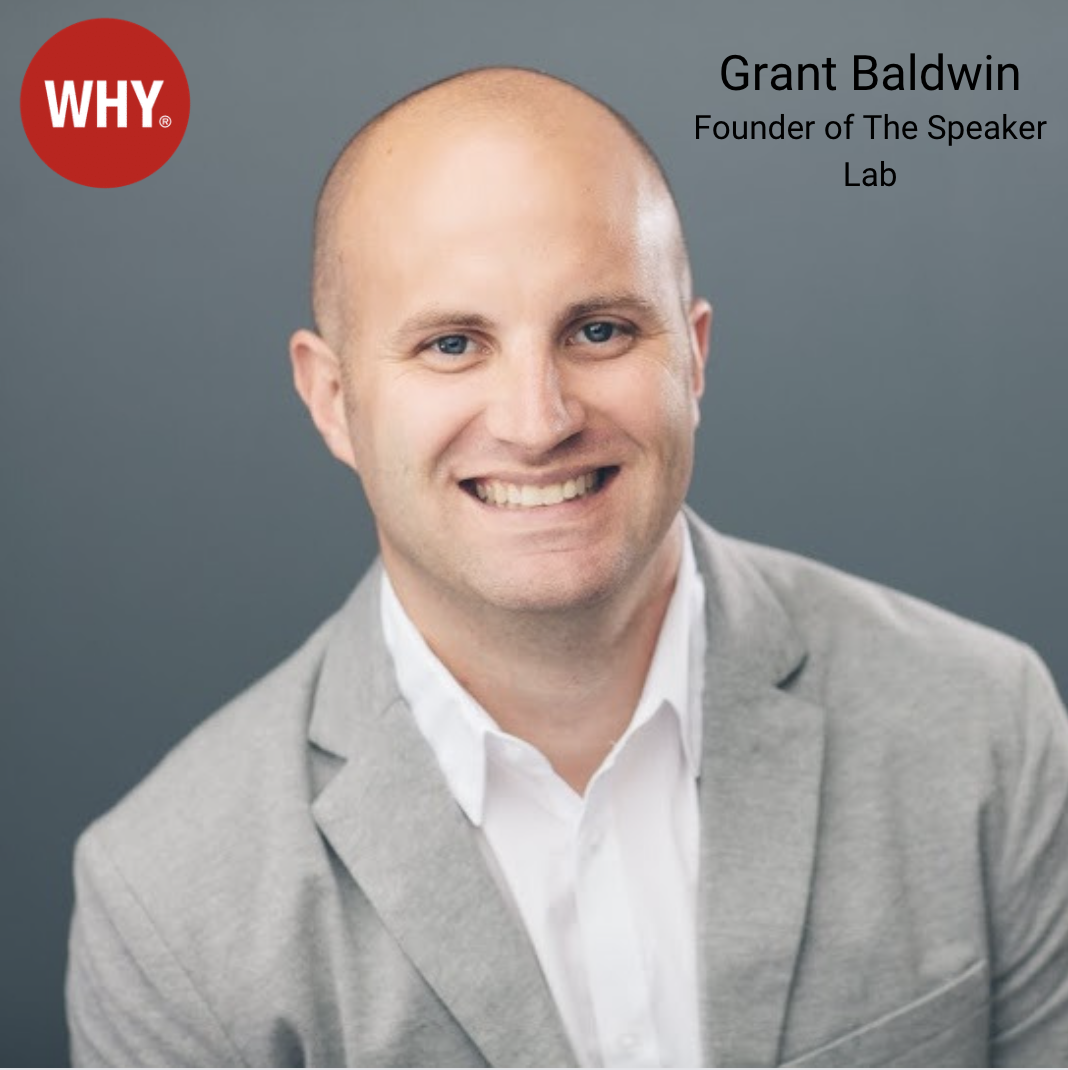
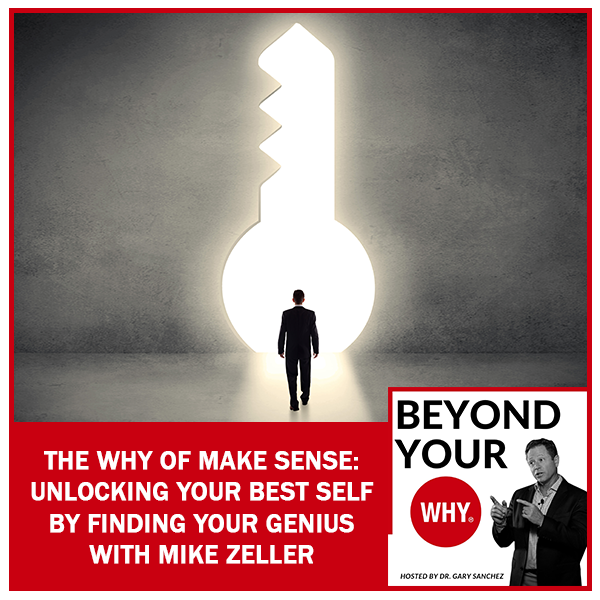
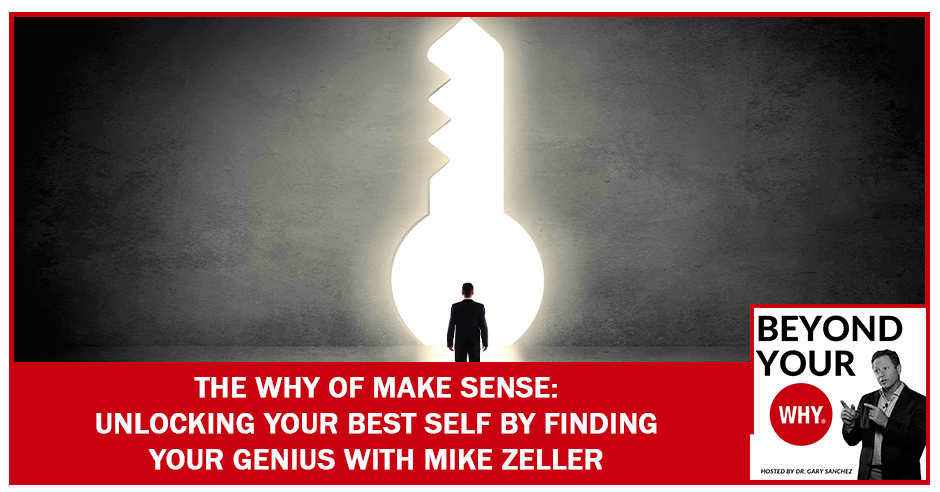





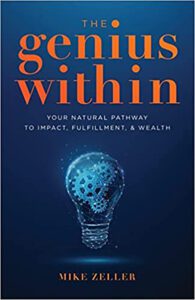
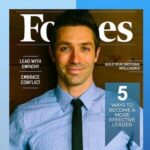 Mike Zeller is a business architect and entrepreneur mentor who helps professionals find their zone of genius and rewire their subconscious to fuel momentum toward their life’s purpose. He has mentored over two hundred high-level entrepreneurs from all over the world, helping add tens of millions in revenue to his clients.
Mike Zeller is a business architect and entrepreneur mentor who helps professionals find their zone of genius and rewire their subconscious to fuel momentum toward their life’s purpose. He has mentored over two hundred high-level entrepreneurs from all over the world, helping add tens of millions in revenue to his clients.